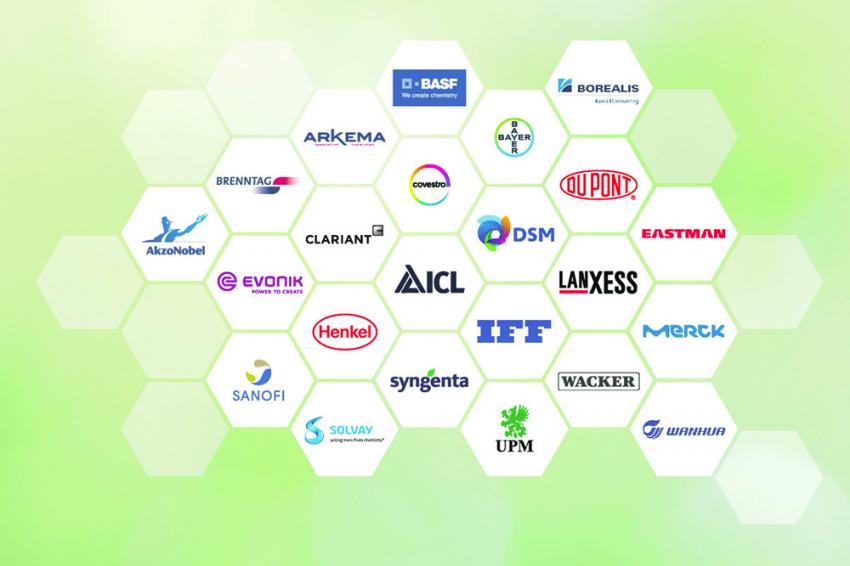Sustainable Chemical Supply Chains
The Together for Sustainability Initiative is Expanding its Global Footprint
The Together for Sustainability (TFS) initiative was launched in 2011 as a joint program of chemical companies for sustainable supply chains. Its goal is to develop and implement a global agenda to evaluate and improve sustainable practices within the supply chains of the chemical industry. Currently, TFS has 23 member companies worldwide and intends to further grow globally. Michael Reubold asked the new president of TFS, Bertrand Conquéret, chief procurement officer (CPO) at Henkel, to explain TFS’s strategy and focus to lead and shape the industry initiative in the next two years.
CHEManager: Mr. Conquéret, after having successfully gone through its initiation and expansion phase in the early years after its launch TFS has entered its growth phase in 2015. How far have you come in making TFS an industry standard?
Bertrand Conquéret: TFS has indeed reached a certain maturity level since its inception in 2011. The achievements include more than 12,000 supplier evaluations in the form of audits and assessments. The number of members increased from the initial
6 to 23 chemical companies, we have active working groups with more than 50 employees of all 23 member companies worldwide, who are collaborating in global and regional teams. Our joint CPO initiative has been working very hard to make TFS grow into an industry standard and we are well on our way to succeeding in this mission.
In terms of growth, what is next on your agenda?
B. Conquéret: From the beginning, TFS set up regional structures by establishing partnerships with regional organizations and putting regional teams in place. These regional actors from all company members and strategic partners will drive the TFS global agenda while at the same time integrate local needs and requirements.
It is TFS’s firm ambition to intensify its global expansion, whether it will be in Asia or in North or South America. In this context, 2018 has been a good year for us, since two new member companies, UPM from Finland and ICL from Israel joined the network. TFS is also very proud to welcome its first Chinese company with Wanhua Chemical Group. By extending its geographic and strategic reach, TFS will not only deliver even more of knowledge and insights into sustainability practices and processes of its extensive pool of suppliers but be able to further improve the sustainability performance of its suppliers as well as the maturity of our member companies’ responsible sourcing programs.
“Chemical companies need to take responsibility for their suppliers’ environmental, social and ethical business practices.”
TFS currently counts 23 members, all well-known companies, without a doubt, but considering the entire chemical industry the sole number represents only a drop in the bucket. Considering the size of those member companies, however, their combined purchasing power must be significant.
B. Conquéret: Yes! Based on the 2018 financial reports, the TFS members generated an aggregate of € 325 billion turnover and represent an estimated spend of € 235 billion. Nonetheless, there is certainly room for expansion continuing to grow by inviting chemical companies to come and work with us. On the other hand, we have clear criteria that potential TFS members need to meet, like being a member or public supporter of the UN Global Compact, the commitment of the applicant to the chemical industry’s Responsible Care program, or at least a performance close to an EcoVadis gold rank.
TFS has established a standard approach for evaluating and improving the sustainability performance of suppliers within chemical industry supply chains.
How does it work?
B. Conquéret: The TFS approach consists of two core elements: TFS assessments, which are based on an expert analysis of a company’s corporate social responsibility (CSR) standards, and TFS audits, which are multiple-day evaluations conducted at a supplier facility. Both are carried out by independent, strategic partners who are market leaders in their respective fields.
Each member company can choose to apply either one or both tools to evaluate suppliers’ sustainability progress, based on the member’s own analyses and supplier selection criteria. The suppliers’ sustainability performance is verified against pre-defined criteria that are tailored to the requirements of the chemical industry.
With the consent of the suppliers, the results of TFS audits and assessments are shared among all members. Hence the TFS principle proves true: “an audit/assessment for one is an audit/assessment for all”.
How does this process improve sustainability?
B. Conquéret: In 2018, approximately 1,500 new supplier assessments were initiated by TFS members via EcoVadis and nearly 360 TFS audits were conducted through the TFS audit program, all results shared with the whole TFS group. Also, within the year 2018, over 2,000 suppliers, who had previously conducted a TFS assessment through EcoVadis, or a TFS audit, documented their progress on improvements.
This program resulted in a pool of supplier audit reports and scorecards and provides member companies with a wealth of sustainability data. TFS members can access insights that cover a significant portion of their procurement base, due to our sharing principle.
The transparency created by the TFS program is a starting point for a constructive dialogue between the supplier and the TFS member company and forms the basis to engage and work with suppliers on implementing tangible, measurable improvements in sustainability as well as shifting their own sustainability performance to the next level.
The aim of TFS is to harmonize requirements and to manage complexity and risk in global value chains. What does TFS mean by ‘sustainable sourcing’?
B. Conquéret: While traditional procurement decisions mainly rely on product quality, on-time delivery and price, TFS adds the sustainability component to chemical supply chains’ focus. The TFS concept integrates 5 key focus areas: management, environment, health & safety, labor & human rights, and governance. As such, our approach builds on the established principles of the United Nations Global Compact and the Responsible Care Global Charter.
Growing stakeholder expectations, whether coming from governments, legislation, customers, employees, NGOs, trade associations or others, imply that chemical companies need to take responsibility for their suppliers’ environmental, social and ethical business practices. To address potential risks and expectations, “sustainable sourcing” becomes an integral part of the TFS’ member companies’ procurement and supply chain management processes.
TFS drives and fosters resilience, efficiency and sustainability of global supply chains in the chemical industry. As such, we aim together to build the global industry’s standard for sustainable supply chains. It is our deepest belief that sustainable supply chains are built on strong partnerships and commitments of its participants to protect the environment and the safety and health of workers, provide fair working conditions, contribute positively to the livelihoods of workers and communities, and operate in full compliance with applicable laws.
What kind of feedback have you received from suppliers who participated in the TFS audit program?
B. Conquéret: Suppliers in general are very positive about their participation in the TFS program. Perceived benefits relate to increased transparency and sustainability improvement opportunities, increased efficiency and the opening of business opportunities. Suppliers confirm they receive valuable information about their positioning in all aspects of sustainability. They can identify opportunities for sustainability improvements, showcase the results of their TFS assessments and audits to other customers within and beyond the TFS network, while risks associated with sustainability requirements are minimized. By sharing the results of the TFS assessments and audits, suppliers increase their efficiency and save time and resources by avoiding multiple requests. Participation in the TFS program provides suppliers with increased business opportunities by strengthening long term customer relationships.
In February, Wanhua Chemical joined TFS as the first company headquartered in the Asia Pacific region. Do you have a roadmap or a wish list for membership growth in this region, and in others?
B. Conquéret: TFS is on an expansion course. From the early beginning, TFS under the leadership of my predecessor has put a structure in place that allows to extend its geographical and strategic reach. Through the development of strategic partnerships and the creation of a network of regional teams, our organization is in good shape to grow globally. This will provide our members with deeper insight into the sustainability performance of their suppliers’ base, as well as with additional opportunities to adjust the sustainability performance of their own operations.
Since 2015, TFS has initiated and fostered strategic partnerships with a range of organizations such as the European Chemical Industry Council, CEFIC, and the China Petrochemicals and Chemicals Industry Federation (CPCIF) to work jointly on improving sustainability in chemical supply chains. To ensure global reach and the development of specific regional topics, TFS established regional teams in China, North and South America, interlinked with global activities.
“TFS adds the sustainability component to chemical supply chains’ focus.”
Essential to TFS’s growth strategy is to attract those members, for whom sustainability in the supply chain is strongly embedded in their strategy. As a member-driven organization, TFS expects its future members to invest time and resources to actively contribute to the TFS activities and shape the future of sustainable global supply chains together. This way, all members as well as suppliers will benefit and sustainability improvements in the supply chains of the chemical industry will be achieved.
China plays an important role as a sourcing region for Western chemical manufacturers. Which role does China play on the agenda of TFS? In your opinion, how is China embracing the visions of TFS?
B. Conquéret: Given the global nature of chemical supply chains, China, as well as other world regions, plays a crucial role in the TFS organization. The inclusion of Wanhua Chemical Group in early 2019 and their fast onboarding has shown how strong the commitment of Chinese chemical companies can be.
Following a cooperation agreement signed between the CPCIF and TFS back in 2016, both parties continue working jointly to promote and improve sustainability in the chemical industry. Together, they focus on raising awareness and promoting TFS participation to suppliers, organize numerous joint supplier trainings and participate in conferences on behalf of TFS. The TFS China team also took part in conferences to present the TFS membership to potentially interested companies. Efforts continue as TFS is committed to extending its reach in China.
Overall, looking back at our journey since 2011, we are impressed by the commitment, enthusiasm and quality delivered by our member companies, partners and suppliers who have been fully embracing the TFS concept right from the start.
Contact
Together for Sustanability (TFS)
Rue Belliard 40
1040 Brüssel
Belgium







